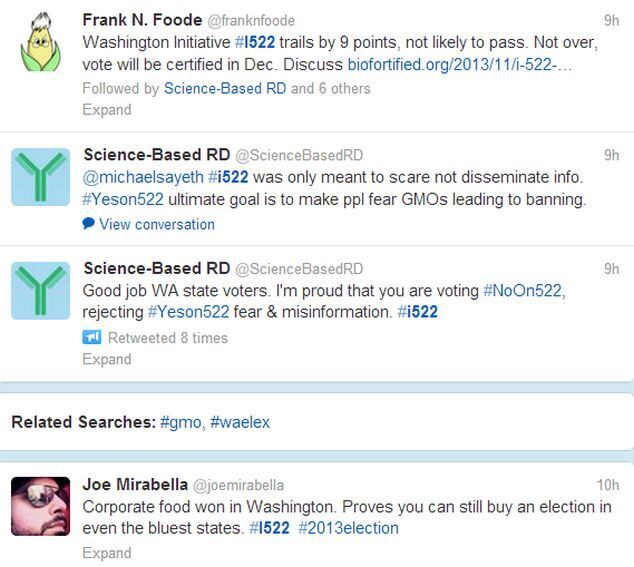A clearer picture isn’t likely to emerge until the end of the week, so it’s too early for the NO campaign to crack open the champagne just yet, but figures on the official website of the Office of the Secretary of State (click here) published at 9.59pm PST last night indicated that the NO's were at 54.83% and the YES's at 44.17%, with 986,806 votes counted (an estimated 60% of the vote).
The initiative got the strongest support in King County (56% in favor), Whatcom County (53% YES), San Juan County (62% YES) and Jefferson County (58% YES); and the weakest support in Adams County, Garfield County and Columbia County (where around 80% voted NO).
However, Washington is a mail-in ballot state, and will count any ballots postmarked by November 5, even if they arrive at the end of the week.
NO campaign: Food labels should convey valuable and accurate information to consumers
While supporters of GMO labeling say the ‘NO’ votes in Washington and California have been effectively ‘bought’ by big food and biotech firms with pockets three times deeper than their opponents and have vowed to continue the fight, opponents say voters understood that I-522 was flawed.
In a press release issued at 11.09pm PST last night, the NO campaign said voters had “soundly rejected” the “ badly written and costly” proposal devised by "anti-GMO activists as part of a self-proclaimed national agenda to ban foods derived from genetically engineered crops".
The YES campaign, meanwhile, said it was too close to call and said it would update stakeholders today at 6pm PST tonight.
I-522 was a badly written initiative that deserved to be rejected
Dana Bieber, spokesperson for the NO campaign said: “With Washington voters, it always comes down to the facts. And the facts showed that I-522 was a badly written initiative that deserved to be rejected."
Meanwhile, Jim Greenwood, President and CEO of the Biotechnology Industry Organization (BIO), said: “Food labels should convey valuable and accurate information to consumers. Mandatory initiatives to label all foods containing genetically modified ingredients would only serve to confuse consumers and raise food prices without any additional benefits."
But he added: “We will continue to explore solutions that provide consumers with valuable information about the foods we eat. One example is the GMO Answers website, where consumers’ questions about GMOs and how our food is grown are asked and answered in a timely manner."
A Monsanto spokesperson told us: "The coalition urged a NO vote on I-522 because its complicated and unnecessary labeling regulations would have unfairly hurt Washington farmers, food producers and grocers, cost taxpayers millions, increase food prices and give misleading information to consumers about the safety of the products they know and trust."
YES campaign: We might lose the battle, but we'll win the war...

However, many observers still believe that the broader GMO labeling campaign has now gained so much momentum that other state-led initiatives will eventually pass.
And this will in turn make a federal GMO labeling law more likely as even opponents of labeling would rather adhere to one set of federal rules than a patchwork of different rules in different states, argue supporters.
Commenting last night, Steve Hoffman, a natural products industry consultant and a member of the Yes on 522 finance committee, said: "We think it is too close to call but the campaign remains very optimistic. I believe we are coming in about where the polls placed us."
Regardless of the final result, he said the I-522 campaign showed the growing groundswell around the country in favor of mandatory GMO labeling, adding: "The genie's out of the bottle on this. There is already talk of what the next state to approach is."
David vs Goliath?

Meanwhile, the narrative that ‘big food’ bought the NO vote by outspending the opposition - which didn’t have as deep pockets - has been gaining traction - and just because Prop 37 and I-522 failed, the pressure on firms to label or avoid GMOs remains as strong as ever, he said.
The fact that the Grocery Manufacturers Association (GMA) only disclosed the names of the food companies that had contributed to the NO campaign after it was sued by Washington state attorney general Bob Ferguson, also fed into this narrative, he told us earlier this week.
He added: “[The NO to I-522 campaign] is by far the largest funded campaign in Washington state history. Everybody’s talking about how corporate money is trying to buy a campaign and I think that story is getting some traction."
OCA: We expect that it will be days, if not weeks, before we know the final outcome
Katherine Paul, director of communications and development at the Organic Consumers Association, said: "Washington is a vote-by-mail state, so there are still hundreds of thousands of votes yet to count. We expect that it will be days, if not weeks, before we know the final outcome.
"Unfortunately, as was the case in California, pesticide manufacturers and junk food companies poured millions of dollars into a deceitful, misleading campaign that clearly influenced many voters. They were so desperate to win in Washington, that they brazenly violated campaign finance laws in an attempt to buy votes."
Biotechnologist: People in urban areas tend to support the process based labels, while those in rural, farm areas do not

Plant biotechnologist Alan McHughen at the University of California, Riverside, told FoodNavigator-USA that his "biggest concern is that the geographical split in Washington mirrors that of Prop 37 in California last year; that is, people in urban areas tend to support the process based labels, while those in rural, farm areas do not.
"This shows that city folks hold an unreal, romantic view of farming and food production, while those more directly involved in farming and food know how meaningless and unworkable process based labels would be.
"As an educator, I'm concerned at anything that further divides our urban and rural communities. The GM label issue is only one aspect of the schism."
What is I-522?

Under the provisions of I-522 processed foods made with ingredients from GE crops would have been required to state 'clearly and conspicuously' that they are ‘partially produced with genetic engineering’ or ‘may be partially produced with genetic engineering’.
However, many products were exempt, including: Certified organic foods, foods sold in restaurants, medical foods, foods made with GM enzymes or other processing aids, alcoholic beverages, food from animals fed GM feed, and (until 2019) foods containing less than 0.9% by weight of 'engineered materials'.
As it stands, federal law does not require the genetically engineered foods to be labeled as the FDA has consistently argued that they do not differ from other foods "in any meaningful or material way" or present any different or greater safety concerns than foods developed by traditional plant breeding methods.
Large food and biotech companies, meanwhile, have consistently opposed labeling because they believe it would reinforce an erroneous perception that there is something wrong with GM crops.
However, supporters of GMO labeling argue that consumers have a right to know what they are eating.
Click on the link below to see that the GMA thinks about the initial results plus two leading food law attorneys.
Click here to keep track of the votes as they are counted.

